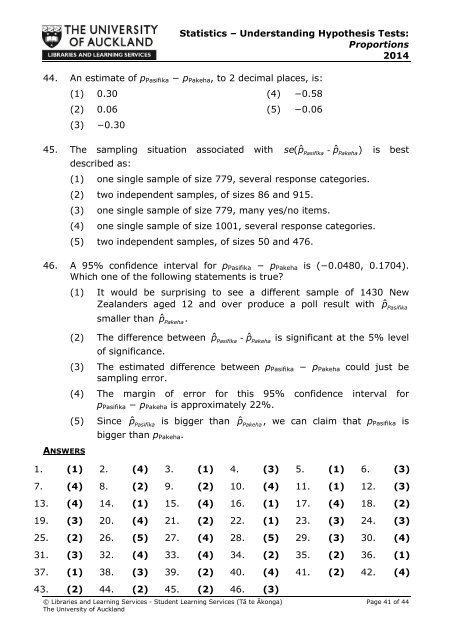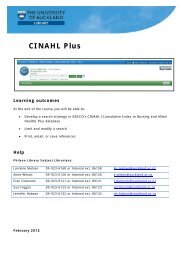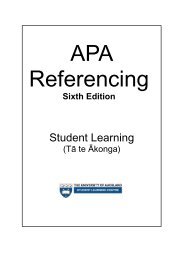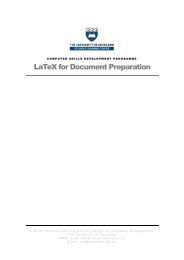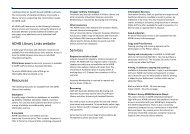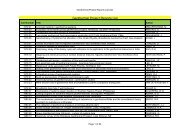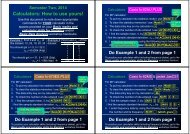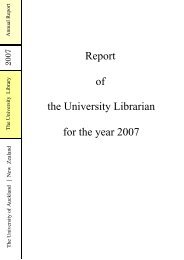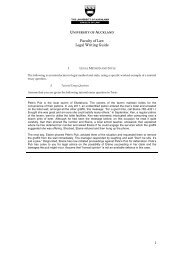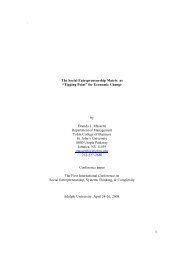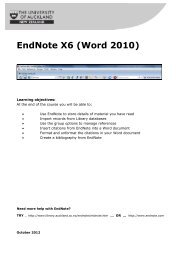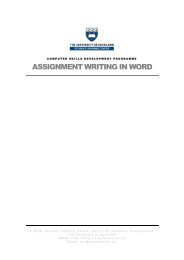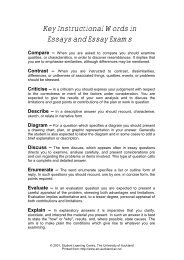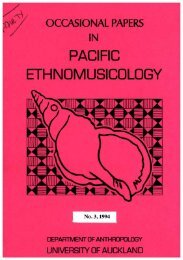STATISTICS â UNDERSTANDING HYPOTHESIS TESTS
STATISTICS â UNDERSTANDING HYPOTHESIS TESTS
STATISTICS â UNDERSTANDING HYPOTHESIS TESTS
You also want an ePaper? Increase the reach of your titles
YUMPU automatically turns print PDFs into web optimized ePapers that Google loves.
Statistics – Understanding Hypothesis Tests:Proportions201444. An estimate of p Pasifika − p Pakeha , to 2 decimal places, is:(1) 0.30(4) −0.58(2) 0.06(5) −0.06(3) −0.3045. The sampling situation associated with se( pˆPasifika- pˆPakeha)is bestdescribed as:(1) one single sample of size 779, several response categories.(2) two independent samples, of sizes 86 and 915.(3) one single sample of size 779, many yes/no items.(4) one single sample of size 1001, several response categories.(5) two independent samples, of sizes 50 and 476.46. A 95% confidence interval for p Pasifika − p Pakeha is (−0.0480, 0.1704).Which one of the following statements is true?(1) It would be surprising to see a different sample of 1430 NewZealanders aged 12 and over produce a poll result with pˆANSWERSsmaller thanpˆPakeha.Pasifika(2) The difference between pˆ Pasifika- pˆPakehais significant at the 5% levelof significance.(3) The estimated difference between p Pasifika − p Pakeha could just besampling error.(4) The margin of error for this 95% confidence interval forp Pasifika − p Pakeha is approximately 22%.(5) Since pˆPasifikais bigger than pˆ Pakeha, we can claim that p Pasifika isbigger than p Pakeha .1. (1) 2. (4) 3. (1) 4. (3) 5. (1) 6. (3)7. (4) 8. (2) 9. (2) 10. (4) 11. (1) 12. (3)13. (4) 14. (1) 15. (4) 16. (1) 17. (4) 18. (2)19. (3) 20. (4) 21. (2) 22. (1) 23. (3) 24. (3)25. (2) 26. (5) 27. (4) 28. (5) 29. (3) 30. (4)31. (3) 32. (4) 33. (4) 34. (2) 35. (2) 36. (1)37. (1) 38. (3) 39. (2) 40. (4) 41. (2) 42. (4)43. (2) 44. (2) 45. (2) 46. (3)© Libraries and Learning Services - Student Learning Services (Tā te Ākonga) Page 41 of 44The University of Auckland


